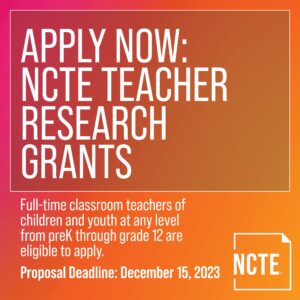This post was written by NCTE member Scott Storm.
I have taught high school English in urban public schools for 15 years. Throughout that time, I have approached this work from a stance of a teacher-researcher-leader, meaning that I have taken an inquiry stance toward professional practice. A routine part of my work has focused on naming, analyzing, and solving problems of practice so as to move my classroom and my school toward more social justice-driven teaching and learning. Taking an inquiry stance toward professional practice means that as a regular part of my teaching I am reading educational theory and research, closely analyzing student work, imagining how the classroom could be better designed for all learners, implementing these designs, and documenting evidence of these processes. For me, the NCTE Research Foundation’s Teacher Research Grant Program was a wonderful fit to support this kind of inquiry stance and help me continue to move teaching practice toward justice.
For this specific grant, a problem of practice that I noticed was that, in English language arts courses, students are often expected to write literary analyses; however, often this kind of writing is taught in ways that feel deadening to students. Too often, the model of teaching the disciplinary content of literary studies is one of transmission—where teachers simplify and transmit knowledge to students who passively accept this information. However, this model of teaching tends to take the exciting practices of literary scholars—many of whom are driven by questions about inequality, representation, justice, and power—and flatten this work while teaching decontextualized autonomous writing skills. Social justice-driven literary scholars are a community of scholar-activists, but many teachers focus only on decontextualized skills of literary form instead of creating classrooms that are vibrant justice-driven communities focused on analyzing literature to understand how human expression reinforces or contests social inequality.
However, I knew that there could be ways to design classrooms to be both justice-driven and community-driven just like communities of critical literary scholars. And the NCTE Teacher Research Grant was a perfect vehicle to support this kind of work.
Sometimes when teachers hear about the opportunity to write a grant, we sort of cower at the thought. Grant writing can instill unease because we sometimes think about grant writing as a technical kind of writing that only a very specialized professional grant writer can do. However, many grant applications are just that—applications. And as teachers, we have lots of experience with applications, from filling out applications for graduate school to helping students apply to college, to filling out all sorts of forms to request field trips, supplies, and more. Much of the writing that teachers already do helps prepare teachers to be successful with grants. Excitingly, the NCTE Teacher Research Grant Program makes the application process quite easy. The application is designed to help walk applicants through the process step by step. The website has included clear sets of questions for applicants to consider and has outlined for applicants the preferred way for organizing the different parts of the application. I found these kinds of supports very helpful as I was completing my application. It made the process smooth and explicit even to people who might have previously thought of themselves as non-grant writers.
It was so exciting to be awarded this grant because it made it possible for me to continue doing the kind of teacher inquiry that helps support my practice in moving toward social justice. Teachers are very busy, and I was able to budget part of the grant money to help with some of the more tedious parts of this kind of teacher inquiry. For my project, I wanted to see what would happen if I engaged youth with reading critical literary theory in my class and then had youth talk about these texts as a group of literary scholars themselves. I wondered how much I would have to model and what would be some ways that I could best support student-talk about these complex texts. I set up my class so that students took turns leading our seminars about these texts and, at first, carefully listened and took notes. We were able to audio record portions of these classes. With these recordings, I wanted to be able to point to student strengths and start to name the excellent kinds of intellectual practices and funds of knowledge that youth brought to this seminar.
The NCTE Teacher Researcher Grant was invaluable because I was able to include in my budget funds for a transcription service to transcribe these recordings. It would have taken me hours to do this work, and instead, the grant was able to support me by doing this part of the work so that I could focus on the interesting questions of practice. Similarly, the grant was able to help me get qualitative coding software and paid for some of the costs associated with attending NCTE to present this research. Because of all this support from NCTE, I was able to do more than just the teacher research to help make my own practice better. I had the time and resources to first bring my work to my department meeting and show everyone in my school what I was learning, and then take the show on the road to tell an even wider audience at the NCTE Annual Convention about this work.
Some grants have very intense reporting systems, which can scare off some teachers. However, the NCTE Teacher Research Grant Program recognizes that teachers are very busy and has designed the reporting requirements to focus on what you did for your project and what you learned from the research. With NCTE, the grant reporting is about what you learned and took away from the grant experience instead of filling out a tedious spreadsheet or bureaucratic forms.
Because of this grant, I was able to systematically find the kinds of strengths that my students brought to their discussions of texts of critical literary theory. One of the parts of this project was my telling students about the amazing assets I was noticing that they brought to this work. One day in my class, we had everyone sit in a circle, and I shared the kinds of intellectual strengths that I observed students doing to move all of us toward developing an ever deeper critical consciousness. Because there were so many wonderful strengths that my students brought, I was able to frame this conversation by going around the circle and saying what we as a community learned about literary analysis from each individual student. For example, I was able to share things like, “From Sage we learned how to question the gender dichotomies that texts set up because gender isn’t actually simply binary,” and “From Lorenzo we learned that we can view video games as literary works with narratives and characters, and as such we can and should be critical of the kinds of representations in these games, which sometimes have sexist depictions that play into the male gaze.” (Note: All student names are pseudonyms.) I wrote up all the learnings, and we created a poster for our wall that every student signed. We also created a handout with these learnings. In our next seminars, students would refer back to the handout and say things like, “I’m going to draw on the work of Sage and deconstruct gender in this text.” These kinds of practices helped make literary analysis feel more connected to students’ lives and also helped build a tight-knit class community, even with nearly 34 students in this untracked class in an open-admissions, in-district, public school in a large city.
NCTE is an amazing group of teacher-scholars. This grant helps to support the work of teacher-scholars and helps make thoughtful, justice-driven teaching and learning possible. Definitely, take advantage of these amazing resources!
 Scott Storm, PhD, has been a member of NCTE since 2009. Having taught high school English for 15 years in urban public schools, Scott has recently started as a visiting assistant professor of education at Bowdoin College where he researches the social and cultural construction of schooling, adolescence, literacies, and social justice. Scott’s research has appeared in English Journal, Journal of Literacy Research, Equity & Excellence in Education, Journal of Adolescent & Adult Literacy, English Teaching Practice & Critique, Theory Research and Action in Urban Education, Schools: Studies in Education, and Literacy Research and Instruction, among others.
Scott Storm, PhD, has been a member of NCTE since 2009. Having taught high school English for 15 years in urban public schools, Scott has recently started as a visiting assistant professor of education at Bowdoin College where he researches the social and cultural construction of schooling, adolescence, literacies, and social justice. Scott’s research has appeared in English Journal, Journal of Literacy Research, Equity & Excellence in Education, Journal of Adolescent & Adult Literacy, English Teaching Practice & Critique, Theory Research and Action in Urban Education, Schools: Studies in Education, and Literacy Research and Instruction, among others.
It is the policy of NCTE in all publications, including the Literacy & NCTE blog, to provide a forum for the open discussion of ideas concerning the content and the teaching of English and the language arts. Publicity accorded to any particular point of view does not imply endorsement by the Executive Committee, the Board of Directors, the staff, or the membership at large, except in announcements of policy, where such endorsement is clearly specified.

2023 NCTE Research Foundation Teacher Research Grants—Deadline: December 15
These grants are supported by the NCTE Research Foundation, which is funded through 5% of all NCTE membership dues.

